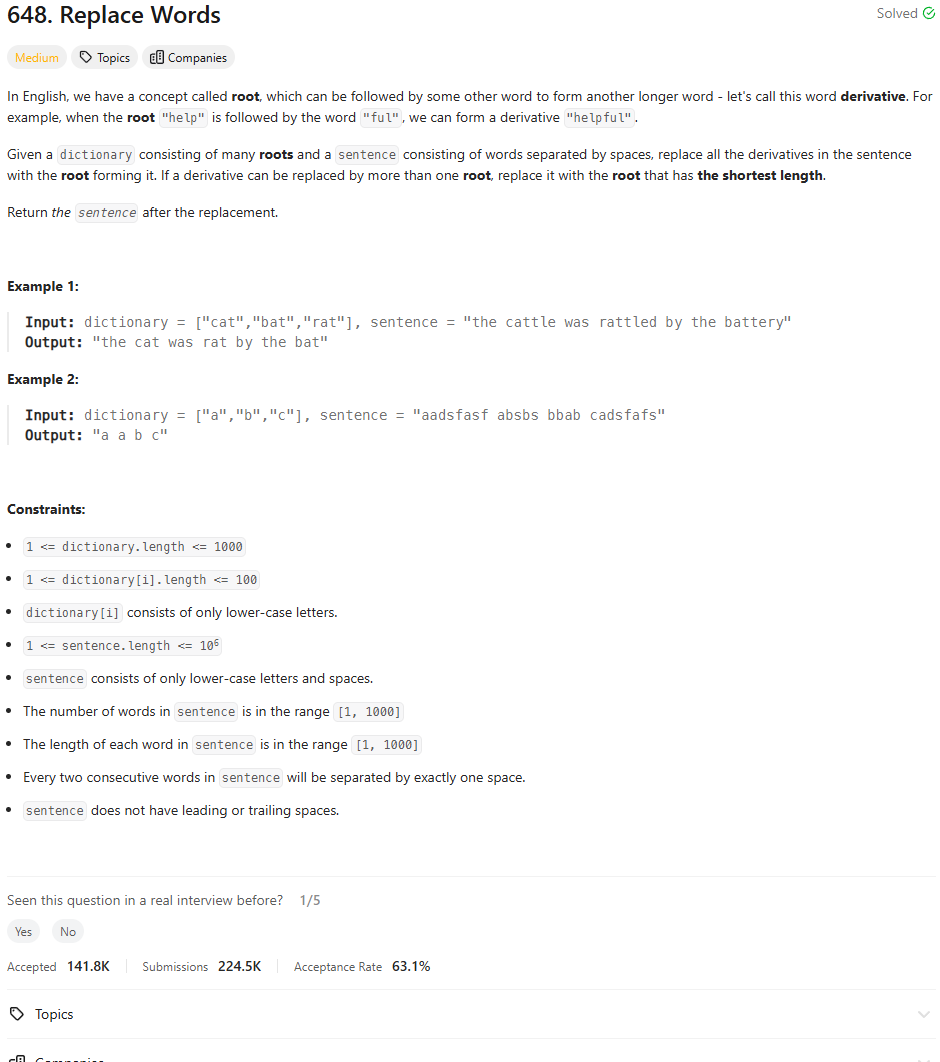Problem of The Day: Replace Words
Problem Statement

Intuition
My initial thought was to use a Trie (prefix tree) for efficient prefix searching. By storing all dictionary words as prefixes in the Trie, I can quickly find the shortest root for each word in the sentence.
Approach
-
Building the Trie: I start by creating an empty Trie. For each root in the dictionary, I insert it into the Trie. Each character of the root is added to the Trie nodes, and I mark the end of a root with a special character (e.g.,
'#'). -
Processing the Sentence: I split the sentence into individual words. For each word, I traverse the Trie to find the shortest prefix that exists in the Trie. If I find such a prefix, I replace the word with this prefix. If no prefix is found, I keep the word as is.
-
Building the Result: After processing all words, I join them back into a single string to form the final modified sentence.
Complexity
-
Time complexity:
- Building the Trie takes O(K) time, where K is the sum of the lengths of all dictionary words.
- Searching for each word’s prefix in the Trie takes O(L) time per word, where L is the average length of the words in the sentence.
- Thus, the overall time complexity is \(O(K + N \cdot L)\), where N is the number of words in the sentence.
-
Space complexity:
- The space complexity for the Trie is O(K), where K is the total number of characters in the dictionary.
- Storing the result list takes O(N) space.
- Thus, the overall space complexity is O(K + N).
Code
class Solution:
def replaceWords(self, dictionary: List[str], sentence: str) -> str:
words = sentence.split()
res = []
trie = {}
for root in dictionary:
curr = trie
for c in root:
if c not in curr:
curr[c] = {}
curr = curr[c]
curr['#'] = True
for word in words:
curr = trie
found = False
for i, c in enumerate(word):
if '#' in curr:
res.append(word[:i])
found = True
break
if c not in curr:
break
curr = curr[c]
if not found:
res.append(word)
return ' '.join(res)
Editorial
Approach 1: Hash Set
class Solution:
def replaceWords(self, dictionary: List[str], sentence: str) -> str:
word_array = sentence.split()
dict_set = set(dictionary)
def shortest_root(word, dict_set):
# Find the shortest root of the word in the dictionary
for i in range(len(word)):
root = word[0:i]
if root in dict_set:
return root
# There is not a corresponding root in the dictionary
return word
# Replace each word in sentence with the corresponding shortest root
for word in range(len(word_array)):
word_array[word] = shortest_root(word_array[word], dict_set)
return " ".join(word_array)
Let d be the number of words in the dictionary, s be the number of words in the sentence, and w be the average length of each word.
- time: O(d * w + s * w^2)
- space: O(d * w + s * w)
Approach 2: Prefix Trie
class TrieNode:
def __init__(self):
self.isEnd = False
self.children = [None] * 26
class Trie:
def __init__(self):
self.root = TrieNode()
def insert(self, word):
current = self.root
for c in word:
if current.children[ord(c) - ord("a")] is None:
current.children[ord(c) - ord("a")] = TrieNode()
current = current.children[ord(c) - ord("a")]
current.isEnd = True
# Find the shortest root of the word in the trie
def shortest_root(self, word):
current = self.root
for i in range(len(word)):
c = word[i]
if current.children[ord(c) - ord("a")] is None:
# There is not a corresponding root in the trie
return word
current = current.children[ord(c) - ord("a")]
if current.isEnd:
return word[: i + 1]
# There is not a corresponding root in the trie
return word
class Solution:
def replaceWords(self, dictionary: List[str], sentence: str) -> str:
word_array = sentence.split()
dict_trie = Trie()
for word in dictionary:
dict_trie.insert(word)
# Replace each word in the sentence with the corresponding shortest root
for word in range(len(word_array)):
word_array[word] = dict_trie.shortest_root(word_array[word])
return " ".join(word_array)
- time: O(dw + sw)
- space: O(dw + sw)